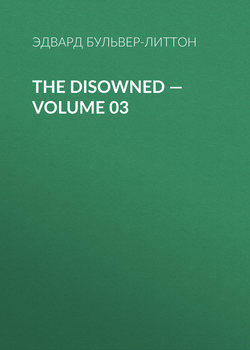Читать книгу The Disowned — Volume 03 - Эдвард Джордж Бульвер-Литтон, Эдвард Бульвер-Литтон - Страница 4
CHAPTER XXIV
ОглавлениеWhat is this soul, then? Whence
Came it?—It does not seem my own, and I
Have no self-passion or identity!
Some fearful end must be—
. . . . . .
There never lived a mortal man, who bent
His appetite beyond his natural sphere,
But starved and died.
—KEATS: Endymion.
On entering his home, Warner pushed aside, for the first time in his life with disrespect, his aged and kindly relation, who, as if in mockery of the unfortunate artist stood prepared to welcome and congratulate his return. Bearing his picture in his arms, he rushed upstairs, hurried into his room, and locked the door. Hastily he tore aside the cloth which had been drawn over the picture; hastily and tremblingly he placed it upon the frame accustomed to support it, and then, with a long, long, eager, searching, scrutinizing glance, he surveyed the once beloved mistress of his worship. Presumption, vanity, exaggerated self-esteem, are, in their punishment, supposed to excite ludicrous not sympathetic emotion; but there is an excess of feeling, produced by whatever cause it may be, into which, in spite of ourselves, we are forced to enter. Even fear, the most contemptible of the passions, becomes tragic the moment it becomes an agony.
"Well, well!" said Warner, at last, speaking very slowly, "it is over,—it was a pleasant dream,—but it is over,—I ought to be thankful for the lesson." Then suddenly changing his mood and tone, he repeated, "Thankful! for what? that I am a wretch,—a wretch more utterly hopeless and miserable and abandoned than a man who freights with all his wealth, his children, his wife, the hoarded treasures and blessings of an existence, one ship, one frail, worthless ship, and, standing himself on the shore, sees it suddenly go down! Oh, was I not a fool,—a right noble fool,—a vain fool,—an arrogant fool,—a very essence and concentration of all things that make a fool, to believe such delicious marvels of myself! What, man!" (here his eye saw in the opposite glass his features, livid and haggard with disease, and the exhausting feelings which preyed within him)—"what, man! would nothing serve thee but to be a genius,—thee, whom Nature stamped with her curse! Dwarf-like and distorted, mean in stature and in lineament, thou wert, indeed, a glorious being to perpetuate grace and beauty, the majesties and dreams of art! Fame for thee, indeed— ha-ha! Glory—ha-ha! a place with Titian, Correggio, Raphael—ha—ha —ha! O, thrice modest, thrice-reasonable fool! But this vile daub; this disfigurement of canvas; this loathed and wretched monument of disgrace; this notable candidate for—ha—ha—immortality! this I have, at least, in my power." And seizing the picture, he dashed it to the ground, and trampled it with his feet upon the dusty boards, till the moist colours presented nothing but one confused and dingy stain.
This sight seemed to recall him for a moment. He paused, lifted up the picture once more, and placed it on the table. "But," he muttered, "might not this critic be envious? am I sure that he judged rightly—fairly? The greatest masters have looked askant and jealous at their pupils' works. And then, how slow, how cold, how damned cold, how indifferently he spoke; why, the very art should have warmed him more. Could he have—No, no, no: it was true, it was! I felt the conviction thrill through me like a searing iron. Burn it—did he say—ay—burn it: it shall be done this instant."
And, hastening to the door, he undid the bolt. He staggered back as he beheld his old and nearest surviving relative, the mother of his father, seated upon the ground beside the door, terrified by the exclamations she did not dare to interrupt. She rose slowly, and with difficulty as she saw him; and, throwing around him the withered arms which had nursed his infancy, exclaimed, "My child!—my poor—poor child! what has come to you of late? you, who were so gentle, so mild, so quiet,—you are no longer the same,—and oh, my son, how ill you look: your father looked so just before he died!"
"Ill!" said he, with a sort of fearful gayety, "ill—no: I never was so well; I have been in a dream till now; but I have woke at last. Why, it is true that I have been silent and shy, but I will be so no more. I will laugh, and talk, and walk, and make love, and drink wine, and be all that other men are. Oh, we will be so merry! But stay here, while I fetch a light."
"A light, my child, for what?"
"For a funeral!" shouted Warner, and, rushing past her, he descended the stairs, and returned almost in an instant with a light.
Alarmed and terrified, the poor old woman had remained motionless and weeping violently. Her tears Warner did not seem to notice; he pushed her gently into the room, and began deliberately, and without uttering a syllable, to cut the picture into shreds.
